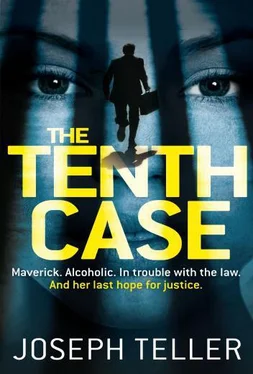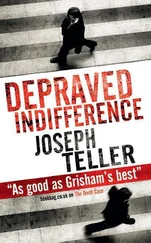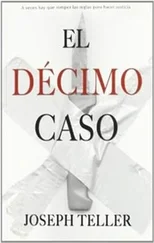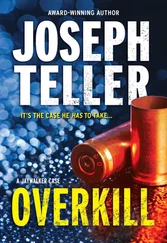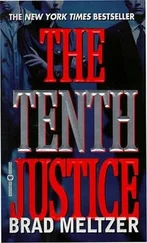Joseph Teller - The Tenth Case
Здесь есть возможность читать онлайн «Joseph Teller - The Tenth Case» — ознакомительный отрывок электронной книги совершенно бесплатно, а после прочтения отрывка купить полную версию. В некоторых случаях можно слушать аудио, скачать через торрент в формате fb2 и присутствует краткое содержание. Жанр: Криминальный детектив, на английском языке. Описание произведения, (предисловие) а так же отзывы посетителей доступны на портале библиотеки ЛибКат.
- Название:The Tenth Case
- Автор:
- Жанр:
- Год:неизвестен
- ISBN:нет данных
- Рейтинг книги:3 / 5. Голосов: 1
-
Избранное:Добавить в избранное
- Отзывы:
-
Ваша оценка:
- 60
- 1
- 2
- 3
- 4
- 5
The Tenth Case: краткое содержание, описание и аннотация
Предлагаем к чтению аннотацию, описание, краткое содержание или предисловие (зависит от того, что написал сам автор книги «The Tenth Case»). Если вы не нашли необходимую информацию о книге — напишите в комментариях, мы постараемся отыскать её.
The Tenth Case — читать онлайн ознакомительный отрывок
Ниже представлен текст книги, разбитый по страницам. Система сохранения места последней прочитанной страницы, позволяет с удобством читать онлайн бесплатно книгу «The Tenth Case», без необходимости каждый раз заново искать на чём Вы остановились. Поставьте закладку, и сможете в любой момент перейти на страницу, на которой закончили чтение.
Интервал:
Закладка:
MS. TANNENBAUM: I did not.
MR. JAYWALKER: Did you hide it behind your toilet tank?
MS. TANNENBAUM: I did not.
Jaywalker asked her if she could explain the dark stains on each of the three items. Samara replied that she had no idea how they'd gotten there. Yes, she'd heard Detective Ramseyer testify that they were bloodstains, specifically Barry Tannenbaum's. No, she hadn't stabbed Barry or cut him with that knife, any other knife, or anything else. Nor could she explain how the three items had ended up behind the toilet tank. Obviously someone had put them there, she said, but it definitely hadn't been her.
From his own exhibits, Jaywalker showed Samara the life insurance application and had her identify her signature. She had absolutely no recollection of having signed it, however, and she'd never sought to take out a policy on Barry's life or anyone else's. She often signed papers that were presented to her by Barry's accountant or lawyer, and rarely took the trouble to read them, instead trusting their as surances that it was in her interest to sign them. Shown the cancelled check that had paid for the six-month premium, she agreed with the testimony of William Smythe that it didn't bear her signature and denied that she'd ever seen it, either before or after it had been deposited by the insurance company. Nor had she noticed the significant dent it made in her account. She rarely if ever opened her bank statements or balanced her checkbook, leaving those tasks to others.
Jaywalker took a deep breath. It was four-thirty, and he was down to one or two remaining topics on his notes. The first of those involved Samara's discovery of the Seconal. Even though she adamantly denied any prior knowledge of it and claimed never to have heard of the phantom pre scribing physician, Jaywalker was afraid the whole thing looked too suspicious. Asking the jurors to believe that whoever had murdered Barry and framed Samara had also been diabolical enough to plant the Seconal in her spice cabinet, hoping the police would find it, was a stretch of immense proportions. Even to Jaywalker, it seemed much more likely that Samara herself had phoned in the prescrip tion, posing as someone from a doctor's office, had been surprised when the pharmacy had asked for the doctor's name, and in her haste had made up a name on the spot, a name that just happened to have the same initials as her own. What were the odds of that? He tried multiplying twenty-six by twenty-six in his head, but couldn't. But he was able to remember that twenty-five squared was six hundred and something. He took his pen and crossed the word Seconal off his list.
It was time to wrap it up.
MR. JAYWALKER: Samara, you've told us there were times you got angry at Barry, very angry. Is that correct?
MS. TANNENBAUM: Yes, I did.
MR. JAYWALKER: Did you ever, in all of your eight years of marriage, get angry enough to want to harm him physically?
MS. TANNENBAUM: No, never.
MR. JAYWALKER: Did you ever strike him, ei ther with part of your body or with something else?
MS. TANNENBAUM: Only once. One time, about five years ago, I threw a soda bottle at him. It hit him on the shoulder, I think.
MR. JAYWALKER: Did it break?
MS. TANNENBAUM: Break? It was one of those plastic ones that you can't break even if you try.
MR. JAYWALKER: Did it appear to injure him?
MS. TANNENBAUM: No, it just bounced off him. It was empty. It wouldn't have injured a mouse. We had a good laugh over it.
MR. JAYWALKER: Other than that incident, did you ever physically harm your husband, or attempt to?
MS. TANNENBAUM: No, never.
MR. JAYWALKER: Did you love him?
MS. TANNENBAUM: I'm honestly not sure. I know I thought I did, at first. But Barry was hard to love, the way he was obsessed with his businesses. And I've never been good at loving. I think I learned early on in my life to close up, to not give of myself. So maybe love was hard for both of us.
MR. JAYWALKER: Did you want to get out of the relationship?
MS. TANNENBAUM: Only when we were ar guing, or fighting, as some people call it. Other than those times, no. I was Mrs. Barry Tannenbaum. Plus I had my own place, my own friends, my own life. As they say in Vegas, it might not have been black jack, but it was good enough to stick with.
MR. JAYWALKER: Did you murder Barry?
MS. TANNENBAUM: No, I did not.
MR. JAYWALKER: Did you take this knife, or anything else, and plunge it through his chest and into his heart?
MS. TANNENBAUM: God, no.
With her denial, Jaywalker walked back to the defense table and took his seat. On a scale of one to ten, he would have given her a solid nine, deducting half a point for too much emotional control down the home stretch and another half for the argument-fight slip. Though he had to give her credit for patching that up a second time, entirely un prompted, near the very end of her testimony.
The only problem was that, given the sheer weight of the evidence against her, he knew a nine wasn't going to be good enough. Hell, a perfect ten might not even do it.
Then again, there was still cross-examination. Jaywalker had learned over the years that jurors subconsciously deducted points on their own during a witness's direct examination. The reason was simple. Direct examination, they intuitively understood, was spoon-fed. It could be re hearsed, re-rehearsed and re-re-rehearsed until it flowed from the witness's mouth with something approaching per fection. Cross-examination was different. On cross, the witness was suddenly confronted with unexpected ques tions and forced to come up with unrehearsed answers.
Most lawyers, if they were aware of the difference at all, regarded it as nothing more than an accepted fact of the trial process. To Jaywalker, it was an opportunity. If he spent twenty hours preparing a defendant for his own questions, and he did, he spent forty preparing that same witness for the prosecutor's questions. What they might include, how to pause reflectively before answering, what the absolute best answer was, and precisely how that answer should be delivered. The result was that, unlike most witnesses, who tend to come off well enough on direct but not so well on cross, Jaywalker's witnesses-and especially Jaywalker's defendants-did even better on cross than they did on direct. And the same jurors who'd deducted points during direct without ever realizing they were doing so were equally prone to give extra credit on cross. So it was entirely conceivable that Samara's best might still be yet to come.
But not now.
Even before Tom Burke rose and asked to approach the bench, Jaywalker knew he would. Rather than start his cross-examination now, at quarter of five, he asked Judge Sobel's permission to go over to the morning.
"Not the morning," said the judge. "I've got my calendar call then. But, yes, you can begin with her tomorrow af ternoon." Then he proceeded to explain to the jurors that they wouldn't have to show up until two o'clock the fol lowing day. To those who had jobs, children, parents or even pets to look after, the five-hour respite seemed to come as the best news in the world. Press people into in voluntary servitude for a couple of weeks, and they'll rejoice over a slice of stale bread.
"Great job," Burke said to Jaywalker, once the jurors had filed out of the courtroom.
"I'm sure you'll blow her away in the first five minutes," said Jaywalker.
If the exchange represented mind games played by op ponents, and surely it did, at the same time it reflected hard earned respect and genuine affection between two men who were not only among the very best at what they did for a living, but who also might have been the best of friends, had only Jaywalker allowed himself that sort of indulgence.
Jaywalker walked Samara up to Canal Street. "You did great," he told her. "Do half as well tomorrow, and I'll take care of the rest."
Читать дальшеИнтервал:
Закладка:
Похожие книги на «The Tenth Case»
Представляем Вашему вниманию похожие книги на «The Tenth Case» списком для выбора. Мы отобрали схожую по названию и смыслу литературу в надежде предоставить читателям больше вариантов отыскать новые, интересные, ещё непрочитанные произведения.
Обсуждение, отзывы о книге «The Tenth Case» и просто собственные мнения читателей. Оставьте ваши комментарии, напишите, что Вы думаете о произведении, его смысле или главных героях. Укажите что конкретно понравилось, а что нет, и почему Вы так считаете.
